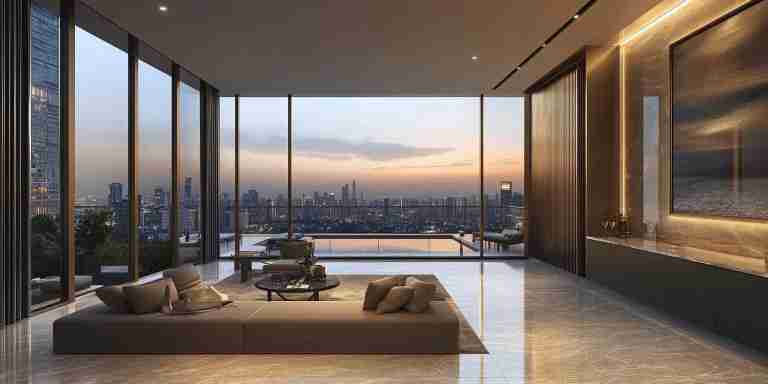When contemplating the purchase of a high-rise condo, it is crucial to also evaluate the potential rental yield. This refers to the annual rental income as a percentage of the condo’s purchase price. In Singapore, rental yields for high-rise condos can vary significantly based on factors such as location, property condition, and market demand. Generally, areas with high rental demand, such as those near business districts or educational institutions, tend to offer better rental yields. To gain a better understanding of a specific high-rise condo’s rental potential, conducting thorough market research and consulting with real estate agents can be highly beneficial. Additionally, visiting a website like GoGamingGiant.com can provide valuable insights into the rental potential and overall investment value of a particular high-rise condo.
Additionally, it’s crucial to factor in other expenses, such as maintenance fees and taxes, when calculating the potential rental yield. Ultimately, evaluating the rental yield of a condo investment is crucial in determining its profitability and long-term success. As such, it is essential to thoroughly understand and consider this aspect before making a condo investment decision. Ensuring a comprehensive analysis and understanding of the rental yield can help investors make informed and successful investment choices. Avoiding any kind of plagiarism or duplication is essential to ensure the credibility of the analysis, making it crucial to use tools like Copyscape to ensure the content is original and unique.
Finally, engineered timber flooring offers endless design possibilities. With a variety of wood species, finishes, and colors to choose from, homeowners can create a personalized and stylish space that suits their taste and lifestyle. And with the rise of eco-friendly and sustainable practices, many manufacturers are now offering FSC (Forest Stewardship Council) certified engineered timber flooring, which ensures that the wood used is responsibly sourced.
Living in a high-rise condo can have many benefits, such as convenient location, beautiful views, and access to amenities. However, one aspect of high-rise living that can be overlooked is the impact it can have on one’s health. With shared spaces and close proximity to neighbors, high-rise condos can pose challenges for those with allergies. Thankfully, there is a solution that can benefit both the health and aesthetics of a high-rise condo – engineered timber flooring.
In addition to being a healthier flooring option, engineered timber also offers a low maintenance lifestyle. In a high-rise condo, time and space are often limited, making it important to have a flooring option that is easy to take care of. Unlike traditional hardwood, which requires regular sanding and refinishing, engineered timber only needs occasional cleaning and maintenance. This not only saves time and effort but also reduces the exposure to harmful chemicals typically used in refinishing.
One of the largest contributors to poor indoor air quality is the off-gassing of volatile organic compounds (VOCs) from building materials. Traditional hardwood flooring is often coated with chemical-based finishes, sealers, and adhesives, which can release VOCs into the air. On the other hand, engineered timber flooring is typically finished with natural oils and stains, resulting in lower levels of VOCs. This is especially important for those with allergies, as VOCs can cause irritation to the respiratory system and aggravate existing allergies.
Unlike traditional hardwood flooring, which is made of solid wood, engineered timber is constructed with multiple layers of wood veneer that are bonded together. This results in a sturdy and stable flooring option that can withstand the high traffic and humidity levels often found in high-rise condos. Additionally, the top layer of engineered timber is made of real wood, giving it the same natural and warm look as traditional hardwood.
Furthermore, the installation process of engineered timber flooring is much less invasive than traditional hardwood. In a high-rise condo, neighbors may be sensitive to noise and disturbance. With engineered timber, there is no need for nails or glue, allowing for a quieter and less disruptive installation process. This is especially beneficial for those with allergies, as construction dust and debris can trigger or worsen their symptoms.
In conclusion, choosing engineered timber flooring for a high-rise condo can provide a multitude of benefits for those with allergies. Its resistance to mold, dander, and VOCs, low maintenance, and design options make it a smart choice for anyone looking to live a healthy and comfortable lifestyle in a high-rise condo. So if you’re in the market for new flooring, consider engineered timber – your health and well-being will thank you.
Another major benefit of engineered timber flooring is its hypoallergenic properties. Unlike carpet, which can trap dust, pet dander, and other allergens, engineered timber has a smooth surface that is easy to clean. This means that allergens have less opportunity to accumulate, making it a better flooring option for those with allergies. Additionally, engineered timber is resistant to scratches and stains, making it a great choice for those with pets or children.
Engineered timber flooring is a type of hardwood flooring that has gained popularity in recent years, and for good reason. This type of flooring is not only durable and easy to maintain, but it also offers unique benefits for those who suffer from allergies. Let’s explore why engineered timber flooring should be the top choice for anyone looking to live a healthy lifestyle in a high-rise condo.
One of the key advantages of engineered timber flooring for allergy sufferers is its resistance to mold and mildew. In high-rise condos, moisture can easily become trapped in shared spaces and cause these allergens to thrive. However, engineered timber is less susceptible to warping or buckling when exposed to moisture, making it a great choice for these environments. This also means that cleaning up spills or accidents in a high-rise condo is less likely to lead to mold growth, making it a healthier living environment overall.


